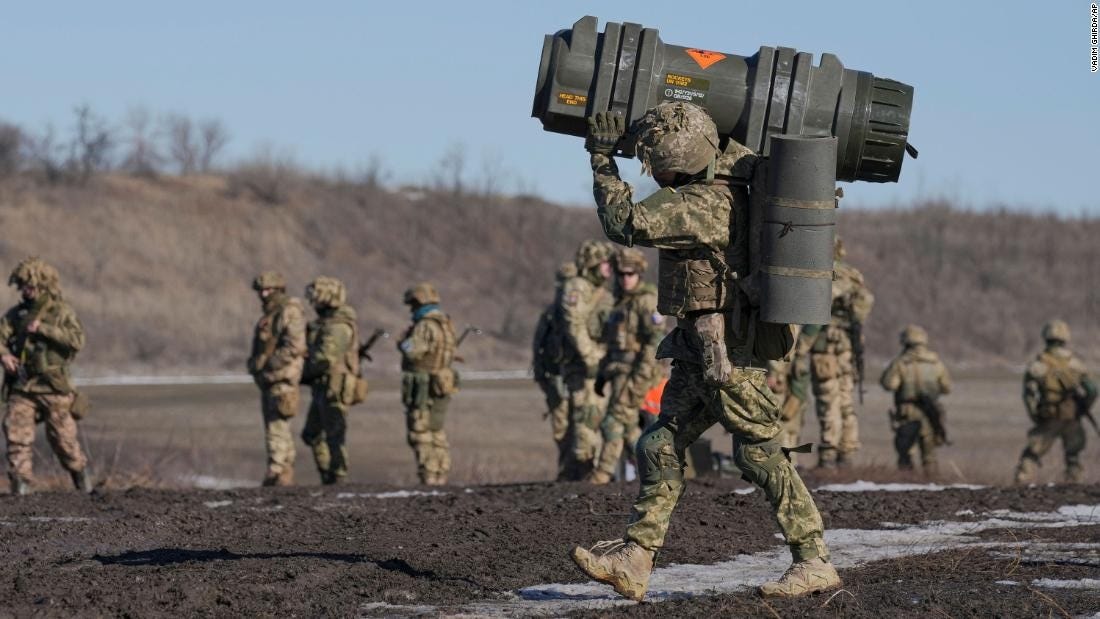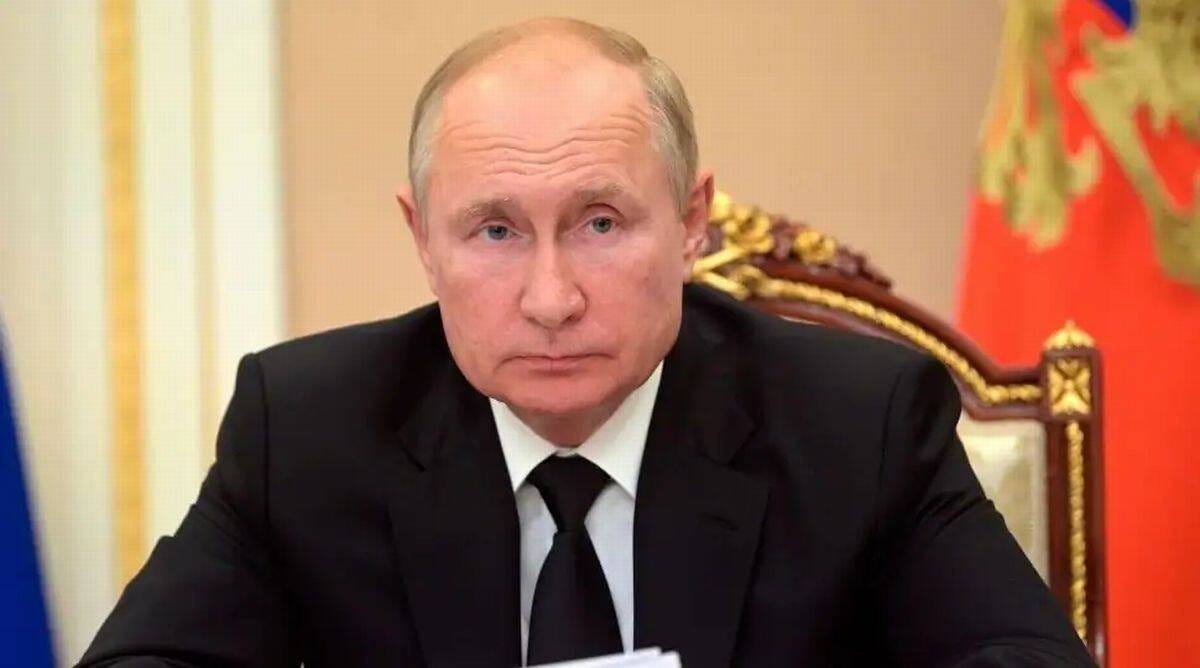War in Ukraine will have global economic impacts that could bring on worldwide depression
Russian infantry and tank corps crossed over into the breakaway provinces of Donetsk and Luhansk hours after President Vladimir Putin announced that he would recognize their independence.
Early Tuesday, Russian troops invaded Ukraine, the excuse being the defense of two breakaway provinces, Donetsk and Luhansk. Russian President Vladimir Putin recognized the independence of the region Monday and responsed to “requests” from the provinces to defend their declaration as “People’s Republics.” (David Stryanovich/TASS News Agency) _______________________________________________________________________________________________________________
In a surprising move, German Chancellor Olaf Scholtz announced Tuesday that regulators will not certify the Nord Stream 2 pipeline in response to Russian troops and tanks crossing the Ukrainian border earlier in the day. Scholz said the pipeline will not open, thus denying lucrative natural gas revenues to Russian interests.
Russian infantry and tank corps crossed over into the breakaway provinces of Donetsk and Luhansk just hours after President Vladimir Putin announced that he would recognize the independence of the two separatist regions, European officials said Tuesday morning.
"Russian troops have entered in Donbas," the name for the area where the two separatist regions, Donetsk and Luhansk, are located, European Union foreign policy chief Josep Borrell said in Paris. "We consider Donbas part of Ukraine."
U.S. officials had been calling Russia’s violation of the Ukrainian border “an incursion,” but mid-morning Tuesday changed their terminology to call it an “invasion.” Members of both U.S. political parties are blaming Biden for his “minor encursion” comment last month, indicating the U.S. would not react strongly to such as situation. They believe Putin heard and made his decision based on Biden’s weakness.
Oil and gas prices worldwide increased overnight, closing at a seven-year high of just over $100 a barrel in Europe after news of the invasion reached Asian and European markets. The Dow Jones average dropped over 230 points in the first 20 minutes of trading in New York. Standard & Poor’s was down 25+ and the NASDAC opened down over 35 points.
The 764-mile pipeline that would carry natural gas from Russia to Germany had not yet begun operating. Gazprom, the wholly-government owned company, finished construction of the supply line in September. However, Germany had yet to authorize opening it up.
Nord Stream 2 is an undersea pipeline bypassing an older pipeline that goes through Ukraine to Germany. Moscow's intent in undertaking the project is to increase its gas export. The revenues from Nord Stream 2 would go directly to the coffers of the Russian government, and enable them to vigorously prosecute the war in Ukraine.
When the U.S. and other Western nations urged Germany to refuse to certify the pipeline, Scholtz balked, as Germany receives nearly one-third of its oil and gas supplies from Russia. But faced with a land war in Europe for the first time since World War II, Scholtz’s energy ministry announced they would not certify Nord Stream 2.
Additionally, the U.K. Foreign Office said Tuesday sanctions would be placed on individuals in Putin’s government and on Russian banks and their executives who have funded both the Crimean occupation and this invasion. The U.K. foreign office released a statement Tuesday announced that "oligarchs at the heart of Putin’s inner circle and banks which have bankrolled the Russian occupation of Crimea have been targeted by the first wave of U.K. sanctions in response to Russia’s further violation of Ukraine’s sovereignty."
European banks reportedly were in near panic Tuesday with the invasion of Ukraine by Russia. Forecasts of rapidly increasing inflation due to oil prices rising and Germany refusing to open the Nord Stream 2 pipeline are fueling the anxiety. (Photo: Via Twitter) _______________________________________________________________________________________________________________
The global economy now faces chaos. The reactions of financial markets overnight indicates the world markets fear inflation, higher energy prices and, potentially, depression of the war is long and drawn out or, worse, expands into eastern Europe.
Seldom in the field of human conflict did so much hang on the whims of one man.
Ukrainian forces are holding a line of contact that occupies more than half of the rebel provinces. The question is, does Putin intend to stop short of that line, thus occupying some of those provinces? Or does in engage the Ukrainian military at that line and push deeper into those provinces, perhaps deeper into Ukraine?
Forces to the north of Ukraine, barely two hours from the capitol of Kyiv, have yet to move from their entrenched positions in Belarus. But those forces are also capable of moving quickly, and should the war in the East go sideways, they could invade from their positions, advance on Kyiv and threaten the democratically elected government.
If Putin is planning a full-scale invasion, with Russian forces thrusting deep into Ukraine to seize the capital, Kyiv, and overthrow the government, world opinion will be strongly against him. If he seeks to annex more territory in eastern Ukraine, carving out a corridor linking Russia with Crimea, the Ukrainian peninsula Putin grabbed in 2014. World opinion will still be negative but it is unlikely any further sanctions ― and certainly not military action ― will be forthcoming.
Then again, he may want a small war, in which Russia “saves” Kremlin-backed separatists.in Donbas, from supposed Ukrainian atrocities—and, at the same time, degrades Ukraine’s armed forces.
Putin has the initiative. It is therefore easy to conclude he has the advantage. In fact, he faces perilous choices. A big war entails extraordinary risks. But a smaller war that limits these risks may fail to halt Ukraine’s Westward drift. And if a small war does not bring the capitulation of the government in Kyiv, Putin may unavoidably be drawn into a larger one.
A full Russian invasion could result in the first toppling of a democratically-elected European government by a foreign invader since Hitler took over most of Europe. Russians would not only suffer casualties, especially during a long-running insurgency, but also cause the death of untold Ukrainians—fellow Slavs, with whom many have family ties.
Russia would also suffer even heavy sanctions than those already imposed. Its banks would be harshly penalized and its economy deprived of crucial American high-tech components. The ultra-rich, including possibly Putin himself, might be prevented from spending and saving abroad. Ordinary Russians would suffer from lower living standards, which have already been falling over the past seven years.
Russian President Vladimir Putin has committed to a course of action in Ukraine that could end with the Russian military securing two breakaway provinces, or plunge Earth into World War III. (Photo: Screen Capture/RT.ru) _______________________________________________________________________________________________________________
Nonetheless, he will most push on, helped by the newly established presence of Russian troops in Belarus to probe NATO’s collective-security pact, under which an attack on one member is an attack on all. Not only would he relish the chance to hollow out America’s commitments to Europe, but he has also come to rely on demonizing an enemy abroad to justify his harsh rule at home. Thin 1984.
Other potential aggressors would take note, too. The likelihood of China invading Taiwan would surely rise, especially with the docility of the U.S. government in failing to take decisive action. It is not that the U.S. should become involved militarily in Ukraine, but that China will take such lack of action as a sign of weakness. President Xi Jinping will consider it a green light to take what he considers a rebel province.
The regimes in Iran and Syria would conclude they are freer to use violence with impunity. If might is right, more of the world’s disputed borders would be fought over. The result could easily, within a year, result in World War III.
With so much at risk, the West should respond in three ways: Deter, keep talking and prepare. To deter Putin, Western powers — especially Germany—should stop equivocating, present a united front and make clear that they are willing to pay the price for imposing sanctions on Russia and also to support those Ukrainians who are ready to resist an occupying army. Not certifying Nord Stream 2 is a start, but not enough.
Meanwhile, diplomats should keep talking, looking for common ground on arms control and pressing for a face-saving deescalation that Putin and his captive media would be free to spin however they wish. Europe should prepare for the next crisis by making clear that its energy transition will cut its dependence on Russian gas by using storage, diversification and nuclear power.
Finally, the U.S. must reverse its ridiculous energy policies. Biden’s closure of the Keystone XL pipeline that sold much of Canadian shale oil to the U.S. and carried the rest to Gulf ports for export was not just a political debt paid to environmental groups that supported him. It was also very likely an action owed to Putin for fear the Biden family’s corruption in Russia, Ukraine and China would be exposed.
Keystone XL must be reopened especially now that Nord Stream 2 is history, so Europe can replace their lost oil and gas resources. Otherwise, oil and gas prices will continue to soar and the West will be forced to buy those products from a greedy OPEC, likely to include Iran and perhaps China. This nation cannot afford to pay $6.00 a gallon or more, the price we would likely be forced to accept if those are our petroleum resources.
Seldom has the difference between a country’s interests and those of its leader been so stark. That is true of the U.S., of the European nations and particularly Russia. That nation would benefit from better, closer, peaceful relations with the West. Such ties would be available if Putin didn’t behave so abominably.
Only he benefits from discord, since he can tell Russians they are under siege and need a strongman to defend them. But even the wiliest strongman can miscalculate. Invading Ukraine could ultimately prove Putin’s undoing, if it turns into a bloody quagmire or makes Russians poorer, angrier and more eager for change. Even if just for his own sake, he should claim a victory over the imaginary threat Russia confronts in Ukraine — and back down.
Mike Nichols is an advocate of the counterrevolution with a four-step plan to defeat Leftist Fascism: We Organize. We Stand. We Resist. We Fight. He is a regular contributor to several conservative news websites and has a regular blog and Facebook presence at Americas Conservative Voice-Facebook.







